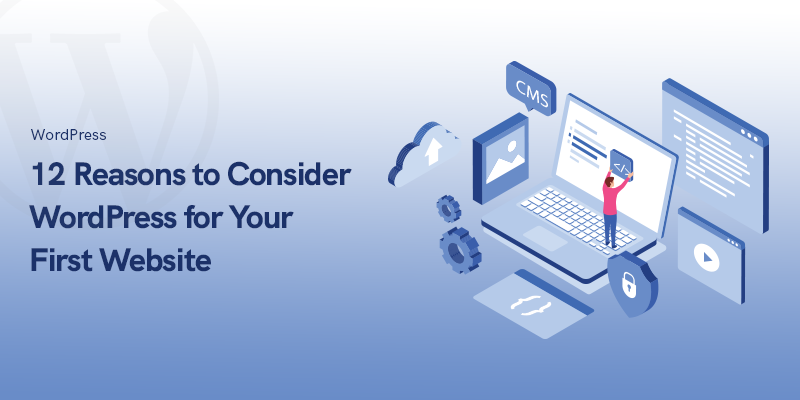Choosing a platform for your first website is an important decision, and WordPress is a popular and versatile option that many people find suitable for various reasons.
Among the many compelling reasons to consider WordPress for your first website are ease of use and setup, a wide variety of themes, and extensive plugins.
This post outlines the main reasons.
Reasons to Consider WordPress for Your First Website
Vast Choice of Themes
WordPress offers a large number of themes that allow you to customize the appearance of your website. Whether you need a blog, portfolio, business site, or e-commerce platform, you can find a template that suits your needs.
User-Friendly Interface
WordPress's intuitive interface makes it easy for novices to create and manage a website without extensive technical knowledge. Setting up this system is a piece of cake, but to make it even simpler, check out this WordPress tutorial.
Extensive Plugin Ecosystem
WordPress has a rich plugin ecosystem that extends the functionality of any website.
Whether you seek to incorporate social media integrations, user-friendly contact forms, powerful SEO tools, robust e-commerce features, or even a comprehensive glossary using a WordPress glossary plugin, you can easily find a plugin tailored to your needs.
SEO-Friendly
WordPress was built with SEO in mind. It generates clean and semantic code, provides customizable permalinks, and offers various SEO plugins to help you optimize your content for search engines.
Community Support
WordPress has a large and active community. This means there are plenty of forums, tutorials, and resources available to help you troubleshoot issues and improve your website.
Responsive Design
Many WordPress themes are responsive, meaning they adapt to different screen sizes. This is crucial in today's mobile-centric world, as it ensures that your website looks good and functions well on various devices.
Scalability
Whether you're launching a blog or planning to run an e-commerce operation, WordPress can scale with your requirements.
Its flexibility allows you to start small and expand your website as your business or project grows.
Regular Updates and Security
WordPress is actively maintained, with regular updates to improve performance, security, and functionality. Additionally, there are numerous security plugins available to help protect your site from potential threats.
Affordable
WordPress itself is free and open-source.
While you could invest in premium themes or plugins, the overall price of starting a basic WordPress website is relatively low compared to some other platforms.
Integration with Social Media
WordPress makes social media integration easy, helping you reach a wider audience and engage with your visitors.
Built-in Blogging Platform
If you plan to have a blog as part of your website, WordPress started as a blogging platform and has robust features for managing and publishing blog content.
Multimedia Support
WordPress supports various multimedia elements, including images, videos, and audio.
This makes it suitable for creative individuals or businesses that want to showcase their work through multiple media formats.
WordPress Alternatives
There are several alternatives to WordPress, each with its own strengths and weaknesses.
The choice of a platform often depends on your specific needs, technical expertise, and preferences. Here are some popular WordPress alternatives:
Joomla
Pros: More advanced than WordPress in terms of functionality, suitable for complex websites.
Cons: Steeper learning curve, fewer plugins and themes compared to WordPress.
Wix
Pros: User-friendly drag-and-drop interface, a variety of templates, all-in-one solution including hosting.
Cons: Limited customization compared to WordPress, may have higher costs for certain features.
Drupal
Pros: Highly flexible and scalable, suitable for complex and large-scale websites.
Cons: Steeper learning curve, may be overkill for simple websites.
Ghost
Pros: Focused on blogging, clean and modern interface, faster performance.
Cons: More limited features compared to full-fledged CMS like WordPress.
Squarespace
Pros: Elegant templates, all-in-one solution, good for visually-oriented websites.
Cons: Less flexibility compared to WordPress, may be limited for more complex sites.
Weebly
Pros: Easy to use, drag-and-drop builder, suitable for small businesses and portfolios.
Cons: Limited scalability for larger websites, fewer third-party integrations.
Magento
Pros: Powerful and scalable for e-commerce, extensive features for online stores.
Cons: Steeper learning curve, resource-intensive, may be overkill for small shops.
Jekyll
Pros: Static site generator, good for simple, fast-loading websites, integrates well with version control systems.
Cons: Requires technical knowledge, not ideal for dynamic content.
Medium
Pros: Simple and clean interface, built for content creators, part of a larger content network.
Cons: Limited customization, not suitable for complex websites or e-commerce.
Hugo
Pros: Fast static site generator, suitable for blogs and small websites, simple to set up.
Cons: Limited in terms of built-in features compared to full CMS.

